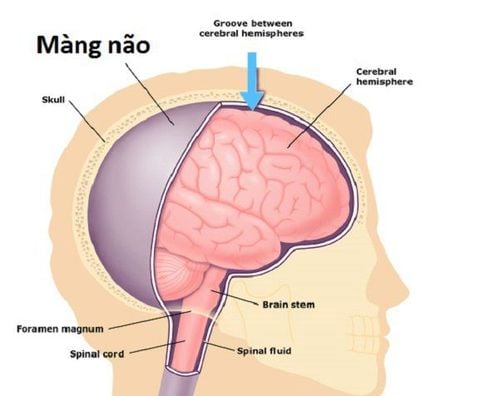This is an automatically translated article.
Brain metastatic cancer is one of the most common forms of cancer, which can increase the mortality rate for patients if not treated early. There are now many advanced treatment methods for brain metastatic cancer, such as whole brain radiation therapy, stereotactic radiosurgery, immunotherapy, etc. Each treatment option will be determined. specific to each type of cancer patient.
1. What is metastatic brain cancer?
Cancer metastasis to the brain is when cancer cells from the original site metastasize to the brain. Research shows that brain metastases are more common than primary brain tumors (cancers that begin to form in the brain) and account for 10 to 30 percent of all cancers.
To clarify the difference between brain metastases and primary brain tumors, let's look at the following example. When lung cancer starts in lung cells, the tumor can break away from the original mass in the lung and travel through the bloodstream or lymphatic system to other parts of the body, such as the brain. This spread of the tumor would be called brain metastases, and the tumor in the brain is made up of lung cancer cells.
Patients can have multiple cancers that have spread to the brain at the same time in different parts of the brain. Any cancer has the potential to spread to the brain, most commonly lung cancer. Several other types of cancer also tend to metastasize to the brain, including melanoma, colon cancer, breast cancer, or kidney cell cancer.
In recent years there has been an increase in the incidence of brain metastases in cancer patients. This also shows that medicine has made important strides to better diagnose brain metastases and help patients prolong life thanks to advanced treatment methods.
2. Signs and methods of diagnosing brain metastases
The following are common signs and symptoms of metastatic brain cancer, including:
The patient has changes in cognition or the way the brain works, such as decreased attention, impaired poor reasoning or memory loss. Mood/behavior changes. Finding it difficult to balance, walking unsteadily, or losing coordination. Vision changes, such as double vision or blurred vision. Affects language ability, difficult to control words. Unusual weakness, sometimes convulsions or headaches. If you notice any of the above signs in your body, you should immediately notify a specialist or visit a hospital for an accurate diagnosis.
At the medical facility, the doctor may recommend that the patient suspected of having brain metastatic cancer perform some of the following diagnostic tests:
CT scan or brain MRI, which helps to check and look for signs abnormalities in parts of the brain. Biopsy should be performed if the primary cancer is unknown or if the patient has undergone a long course of treatment for the original primary cancer and develops new symptoms.
3. Symptom management of metastatic brain cancer
The human skull is usually hard, providing good protection for the brain. Inside the skull there is very little extra space. When cancer metastasizes to the brain, the tumor takes up space in the brain and puts pressure on surrounding tissues. This pressure can lead to symptoms such as changes in behavior, vision, mood, language,... and other brain-related functions.
The goal of symptom management for brain metastases is to relieve pressure on the tumor with medications such as oral corticosteroids (Prednisone, Dexamethasone) or intravenous (IV) lines. When starting steroids, some patients may notice immediate remission of symptoms of brain metastases. However, this is only a symptom control measure and does not work to make the tumor disappear. In addition, doctors may also prescribe some medications to help prevent or treat seizures caused by cancer that has spread to the brain.
4. Measures to treat brain metastatic cancer
4.1 Surgery to treat cancer that has spread to the brain Surgery is often used to treat lesions in a safe and easily accessible area of the brain. Patients after surgery can undergo whole brain radiation therapy (WBRT) to reduce the risk of cancer recurrence and improve better quality of life.
4.2 Whole brain radiation therapy (WBRT) Whole brain radiation therapy (WBRT) is radiation therapy delivered to the entire brain. This method is often used when surgery is not an appropriate option for the patient or there are more than 3 lesions in the brain. Besides, WRBT therapy is also used with radiation surgery.
In general, whole brain radiation can cause cancer cells to appear in the normal part of the brain, but they are not enough to form a tumor. Targeted WBRT therapy attempts to kill all cancer cells, even those that have not yet formed. Research shows that whole brain radiation therapy improves symptoms of brain metastases in 70 to 90% of patients, although some of these are the result of corticosteroid use. In addition, patients with tumors that are more sensitive to the effects of radiation (eg, breast, lung) will respond better than those with tumors that are less sensitive to radiation (kidney or lung cancer). malignancies).
4.3 Stereotactic radiosurgery (SRS) Stereotactic radiosurgery (SRS) is therapy that delivers a large dose of radiation to a tumor site precisely. When performing, the patient's head will be kept still, brain metastases need to reach 3cm or less to be treated with SRS.
SRS therapy will deliver a single dose of Gamma Knife® or up to 5 doses of Cyberknife®. If a patient has 2 distinct types of brain metastases, both can be treated with SRS on the same day. This treatment will be done with a traditional radiation machine (linear accelerator) or a specialized machine such as Cyberknife®, Gamma Knife®, ExacTrac® and XKnife®.
Gamma Knife® can emit hundreds of beams of radiation from a cobalt source and concentrate at the point where all beams meet. The radiation beams will pass through hundreds of holes in the helmet, allowing a high dose of radiation to be precisely delivered to the tumor while protecting surrounding normal tissue.
XKnife® is a linear accelerator based brain metastatic cancer treatment. Similar to Gamma Knife, XKnife® will use a set of frames to immobilize the patient's head during the entire treatment.
Cyberknife® is a form of SRS that uses a specialized miniature linear accelerator with a robotic arm. Instead of using a head restraint, this treatment will have the patient use a custom mask along with skull-based tracking, helping the robot perform the target tracking function. Cyberknife® can also treat lesions in the brain larger than 3cm and for other parts of the body.
Proton therapy is a newer form of SRS that uses a Synchron or Cyclotron machine to accelerate protons (positively charged particles). The high energy of these moving protons attacks and destroys cancer cells in the brain. During the treatment, the protons will precisely target the tumor. Currently, this therapy is still a growing area of radiation therapy.
4.4 Chemotherapy for metastatic brain cancer Many people believe that most chemotherapy drugs cannot cross the blood-brain barrier even though they travel through the bloodstream, however there are exceptions. Some researchers have found that brain metastases from chemotherapy-sensitive tumors, such as lymphoma, testicular cancer, and small cell lung cancer, are also sensitive to chemotherapy. treat. In addition, patients who did not previously receive much chemotherapy may have a greater reduction in brain metastases with chemotherapy.
Currently, the chemotherapy drug that has the ability to cross the brain barrier used to treat cancer that has spread to the brain is Temozolomide (Temodar®). In addition, this drug is also used to treat certain brain diseases.
Chemotherapy such as immunotherapy or targeted therapy may also be useful for the treatment of metastatic brain cancer. Through biomarkers, doctors can identify effective treatments or chemotherapy for patients with metastatic brain cancer. This shows that the treatment is no longer based solely on the type of cancer but is much more specific to the genetic makeup of the tumor.
Targeted therapies are the use of drugs that target certain mutated genes in cancer. These drugs have very different side effects than standard chemotherapy, and can be used alone or in combination with standard chemotherapy. Several targeted therapies are used in the treatment of brain disorders, including erlotinib, lapatinib, Vemurafenib, or gefitinib.
In addition, metastatic brain cancer can also be treated with immunotherapy – using the body's own immune system to find and destroy cancer cells. Nivolumab, Ipilimumab, or Pembrolizumab are immunotherapy drugs used to treat many different types of cancer.
Early cancer screening is considered a perfect measure in the timely detection and treatment of all types of cancer. Vinmec International Hospital currently has high-tech cancer screening and examination services, including genetic testing, imaging, and biomarkers for early tumor detection. A single gene test can assess the risk of 16 common cancers in both men and women.
Please dial HOTLINE for more information or register for an appointment HERE. Download MyVinmec app to make appointments faster and to manage your bookings easily.
Reference source: oncolink.org












